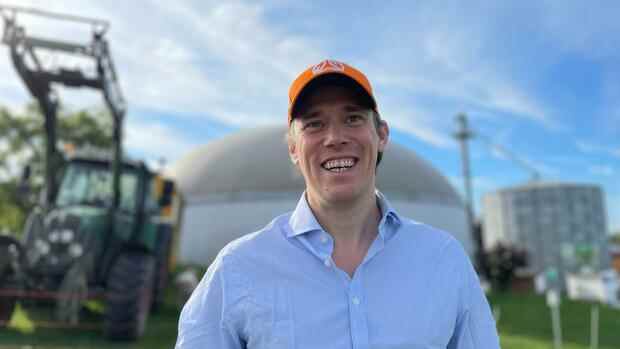The founder used to work for the software company SAP – meanwhile, with his start-up, he has returned to the subject of agriculture.
Munich Many farmers have long since automated and digitized their machinery. “But there is still a lot of catching up to do in terms of business processes and communication,” says Hubertus Mai, founder of the start-up Airfarm. When farmers want to find out about new developments or funding programs, printed agricultural magazines are often the first choice.
With Airfarm, Mai wants to provide the most important digital information tool for the industry. The company has developed an app for farmers. Seed and fertilizer companies can use the channel, for example, to present new products. Clubs and associations are also involved.
The Airfarm team has high hopes for a new function: With the help of seven questions, farmers can find out which funding programs are suitable for them and which deadlines have to be observed. “For many, the funding landscape is still difficult to understand,” says Mai. “We want to democratize agricultural knowledge.”
The 38-year-old entrepreneur was on the move between two worlds for a long time: he grew up in the country, his wife is a farmer. In the early days of online retailer Zalando, Mai learned to scale start-ups, lived in Shanghai, Berlin and Cambridge and worked for SAP for several years. “I flew through Europe Monday through Thursday and advised companies on the digitization of their processes,” says Mai. “At the weekend I ran across the fields with my wife and learned a lot about plants.”
Top jobs of the day
Find the best jobs now and
be notified by email.
Resistance from Airbnb
This is how the idea of founding Airfarm arose. The platform giant Airbnb initially resisted the name. Airfarm is now registered as a trademark.
Several thousand farmers are already using the app. The agricultural association DLG and the crop cultivation consultancies NU Agrar and Hanse-Agro are also represented on the platform as content providers.
In principle, farmers in Germany are open to digitization. According to a study by the German Farmers’ Association and Bitkom, 82 percent of farms in Germany use digital technologies and solutions in some form – from milking robots to GPS-controlled agricultural machines. “Digitization of individual processes or production methods is part of everyday life in agriculture,” says DBV General Secretary Bernhard Krüsken.
With the help of seven questions, farmers at Airfarm can find out which funding programs are suitable for them.
In the meantime, both the large agricultural groups and young companies are relying on the digitization of agriculture. The start-up Agrando sees itself as “Germany’s largest independent agricultural trading platform”. The Munich-based company wants to bring farmers, dealers and manufacturers together on one platform and digitize all processes.
The agricultural giant Baywa has developed an intelligent farm management information system with its subsidiary Farmfacts. According to the company, a quarter of the agricultural area in Germany is already managed with it. With programs such as Next Farming, farmers can plan the cultivation and determine the fertilizer requirement for example with the help of algorithms based on satellite data.
So far there is no independent digital platform
However, in the opinion of maize, there is no central, independent digital platform on which farmers can find out about the right seeds in autumn, for example.
Airfarm’s business model is based on several pillars. There is a free basic version of the app for farmers. However, the premium offer costs a monthly fee. The providers, in turn, pay for the dissemination of their information. In addition, there is now the “funding path” with information about subsidy options. This costs 50 euros a month.
Airfarm has now been able to win the first investors in a seed financing round. The company raised $ 2.8 million from donors in the United States, among others.
Many companies have already developed a stylish app. But money can only be made with it if it becomes irreplaceable for users. “That is what drives us,” says Mai. He is confident that it will succeed – and is already targeting the next markets in Eastern Europe.
More: Chopping robot instead of glyphosate. How the Baywa wants to fight weeds.
